The AMD 2nd Gen Ryzen Deep Dive: The 2700X, 2700, 2600X, and 2600 Tested
by Ian Cutress on April 19, 2018 9:00 AM ESTCPU Legacy Tests
Our legacy tests represent benchmarks that were once at the height of their time. Some of these are industry standard synthetics, and we have data going back over 10 years. All of the data here has been rerun on Windows 10, and we plan to go back several generations of components to see how performance has evolved.
All of our benchmark results can also be found in our benchmark engine, Bench.
3D Particle Movement v1
3DPM is a self-penned benchmark, taking basic 3D movement algorithms used in Brownian Motion simulations and testing them for speed. High floating point performance, MHz and IPC wins in the single thread version, whereas the multithread version has to handle the threads and loves more cores. This is the original version, written in the style of a typical non-computer science student coding up an algorithm for their theoretical problem, and comes without any non-obvious optimizations not already performed by the compiler, such as false sharing.
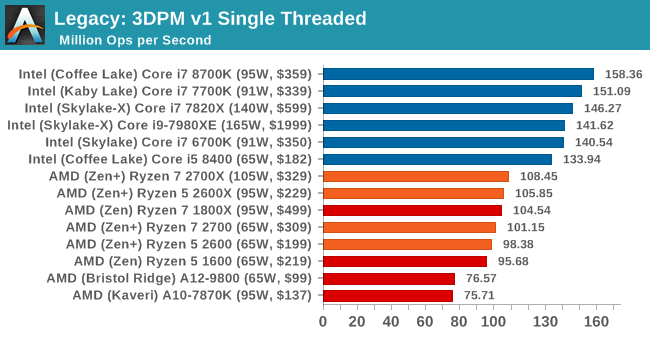
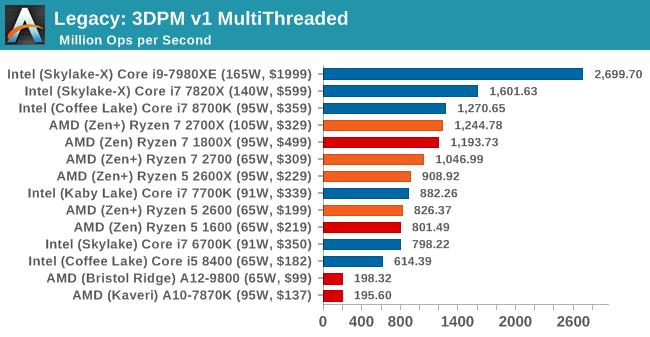
CineBench 11.5 and 10
Cinebench is a widely known benchmarking tool for measuring performance relative to MAXON's animation software Cinema 4D. Cinebench has been optimized over a decade and focuses on purely CPU horsepower, meaning if there is a discrepancy in pure throughput characteristics, Cinebench is likely to show that discrepancy. Arguably other software doesn't make use of all the tools available, so the real world relevance might purely be academic, but given our large database of data for Cinebench it seems difficult to ignore a small five minute test. We run the modern version 15 in this test, as well as the older 11.5 and 10 due to our back data.
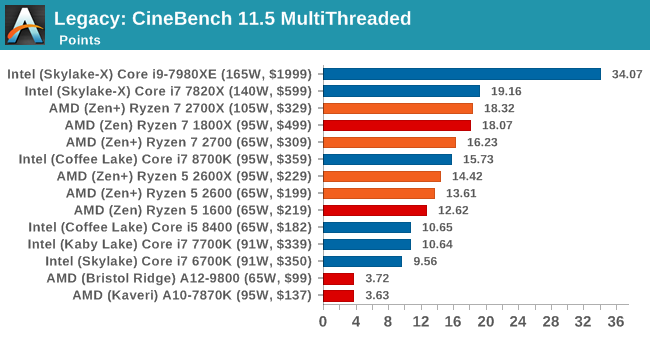
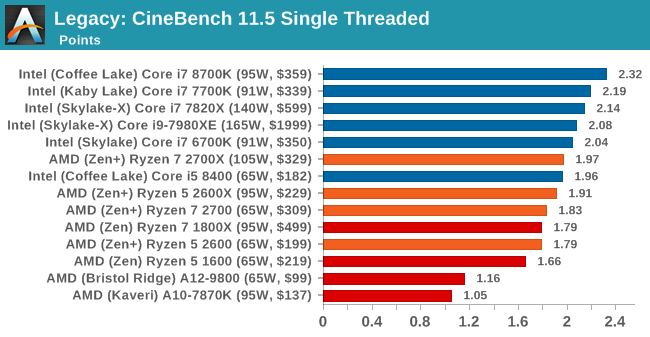

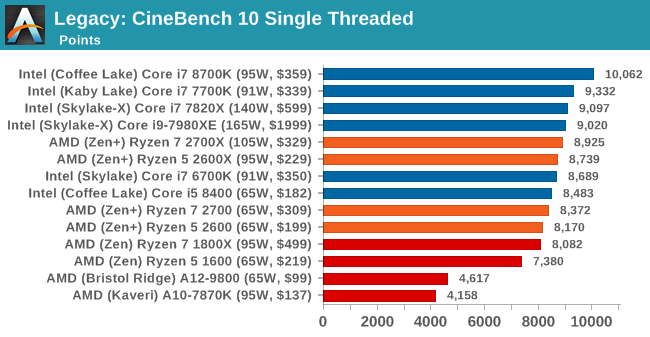
x264 HD 3.0
Similarly, the x264 HD 3.0 package we use here is also kept for historic regressional data. The latest version is 5.0.1, and encodes a 1080p video clip into a high quality x264 file. Version 3.0 only performs the same test on a 720p file, and in most circumstances the software performance hits its limit on high end processors, but still works well for mainstream and low-end. Also, this version only takes a few minutes, whereas the latest can take over 90 minutes to run.
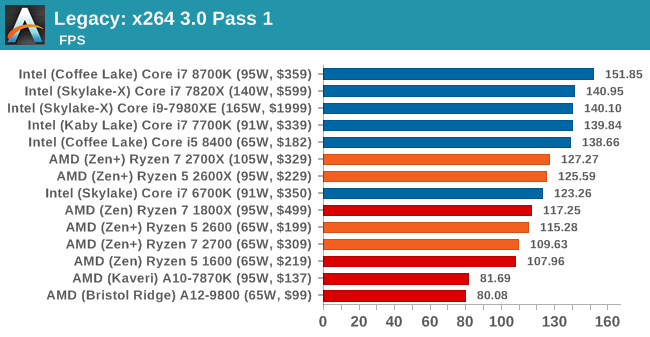
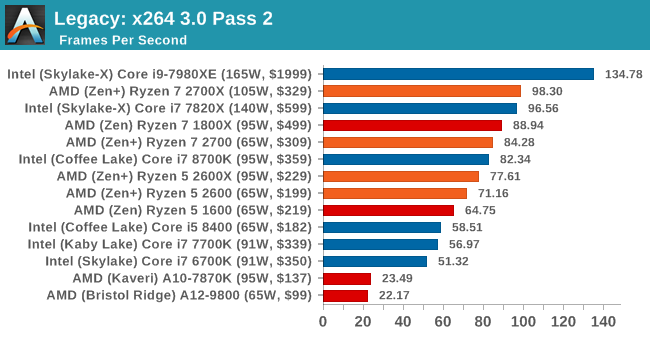










545 Comments
View All Comments
danjw - Friday, April 20, 2018 - link
They Anandtech used the rated speeds that the processors were stated to support by the manufactures. Anandtech, is using everything at stock. Anandtech ran all the processors through fully patched systems (both bios and OS). Not every website other tests to these same methodology. So, there will be differences in their results. None the less, Anandtech, is auditing their results to double check them. I really don't think they are going to see anything wrong. Toms, ran their Intel parts without the latest bios updates. Others overclocked their systems.Most users do not overclock their systems. Sure, a lot of us readers do, but not everyone. I overclock my systems, but, my two brothers who are both just as technical as I am, do not. It is a choice some make and others do not. The majority of users do not overclock. So, Anandtech does not overclock in their most reviews. They have at times in the past and may in the future include overclocking results in reviews, but they have are always broken out the overclocking results in a separate section and/or labeled the overclocked results to differentiate them from the standard clocked results. These are editorial choices that Anandtech makes, I don't see any problem with that.
Luckz - Monday, April 23, 2018 - link
Intel for some reason have 4 memory sticks. Weird idea.werpu - Friday, April 20, 2018 - link
Well the main difference is they tested against fully meltdown and specte patched systems, which in fact is the norm, while all other reviewers simply tested against bare metal. It is known that Intel took a pretty serious hit especially with Meltdown and a more serious hit with Spectre compared to AMD which did not have meltdown at all and to a lesser degree Spectre than Intel did.I would say Anandtechs tests are spot on.
And this reflects the sad state of nowadays performance testing which seems to be done to 99.9% by incompetent idiots or fanboys (especially the youtubers are the worst)
However in extreme situations Intel again wins since the 8700k can be oced by decapping and good cooling to 5GHz while the OC capabilities of the 2700x are basically non existent. It really depends, which is better. But the performance gap is closing and in non OCed system it is not existent anymore. It will be interesting next year when AMD has moved to 7nm while Intel still will be stuck at 10nm which they currently try to pull it but not have yet managed. Then the game might be entirely reversed.
Alphasoldier - Friday, April 20, 2018 - link
Unfortunatelly, you are the only idiot and fanboy here. Pretty much everyone stated in their reviews, the system were fully patched, all cpus were reused and everything was retested, because AMD fanboys were screaming Meltdown here, Spectre there.Now, the internet is full of this garbage review, it spreads like cancer, because AMD fanboys have nothing better to do, once again they are disappointed that 6 cores from Intel outperformed 8 cores from AMD and they are now like the Liverpool fans repeating "The next year will be ours"
But at least they got some fancy RBG cooler.
Fallen Kell - Friday, April 20, 2018 - link
Alphasoldier, I've been reading the reviews, and while many have stated they have applied the software (OS) patches, very few have stated they applied both the software and BIOS patches for the Spectre variant 2. Thew few places that I have seen which have stated both the software and BIOS patches were applied all seem to be showing much more similar results as the AT article.In anycase, Ryan stated they are looking into it, and I am certain we will see an update within the next few days. And don't come saying that I am a AMD fanboi, I havn't purchased a AMD CPU since the Thunderbird (i.e. a slot A CPU).
mapesdhs - Saturday, April 21, 2018 - link
werpu, oc an 8700K to 5GHz? Makes me laugh that a 300MHz bump over a CPU's max single core turbo is even called an oc these days. Sheesh, it's a far cry from the days of SB, oc hardly seems worth bothering with now.mkaibear - Thursday, April 19, 2018 - link
It's here, it's here!Dr. Swag - Thursday, April 19, 2018 - link
What is with the gaming benchmarks? On your tests the whole ryzen 2 series is a step above everything else, but all other reviews show it between ryzen and coffee lake...fallaha56 - Thursday, April 19, 2018 - link
This is the Spectre2 patch effectNot looking great for Intel and HFR gaming
Ryan Smith - Thursday, April 19, 2018 - link
"What is with the gaming benchmarks?"We're looking into it right now. Some of these results weren't in until very recently, so we're going back and doing some additional validation and logging to see if we can get to the bottom of this.